| Srl | Item |
| 1 |
ID:
090164
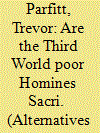

|
|
|
|
|
| Publication |
2009.
|
| Summary/Abstract |
This article examines how the concept of biopolitics is applied in development studies, focusing especially on Giorgio Agamben's account of biopolitics as intrinsic to the analysis of sovereignty and a state of exception. Agamben analyzes sovereignty as a biopolitical enterprise of disciplinary control in which sovereign power is able to enforce its role by the most draconian means while remaining nominally within the law. Agamben further claims that development is a biopolitical enterprise through which the Third World poor are reduced to a situation of bare life. The article interrogates this proposition, questioning how far biopolitics/development must necessarily be conceived as an exercise in oppression.
|
|
|
|
|
|
|
|
|
|
|
|
|
|
|
|
| 2 |
ID:
089500
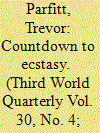

|
|
|
|
|
| Publication |
2009.
|
| Summary/Abstract |
This paper examines the antinomies posed by a consideration of development as eschatology. Development is generally conceived as a grand narrative with humanity progressing inevitably to a redemptive goal, whether this be revolution or Rostovian consumerism. It is eschatological in structure. This opens development theory up to critique. Grand narratives premised on an end of history are open to criticism as utopian and exclusory through setting a limit-they conceive of a redemptive ending of time, but repress those excluded from the vision. However, this eschatological structure may also have a function in the shape of the Derridian conception of 'the promise'. This concept refers to a need to posit a closure that incorporates a redemptive, Messianic moment, which impels us to pursue the promise of that moment of development. Thus, the eschatological structure of development incorporates a risk of utopianism/exclusory violence-but we need the Messianic moment in order to conceptualise the goal that drives us to strive for progress.
|
|
|
|
|
|
|
|
|
|
|
|
|
|
|
|
| 3 |
ID:
151510
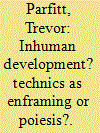

|
|
|
|
|
| Summary/Abstract |
This paper will examine some of the ways in which development has been influenced by the body of ideas known as techne, or technics. This body of ideas focuses on a central theme that envisages technology broadly defined as developing its own impetus that removes it from the control of human agency and that begins to circumscribe and even control human agency. This can be seen as having various impacts on development, notably a subsumption of any concern for human development to issues concerning process and production of outputs. The paper focuses on the approach of Heidegger as he provides an account that places technology at the centre of human being, whilst helping to distinguish both the negative (enframing) tendencies and the emancipatory (or, as Heidegger might have it, poietic) possibilities of technics. The paper concludes by identifying some of these negative and emancipatory influences in the development context.
|
|
|
|
|
|
|
|
|
|
|
|
|
|
|
|
| 4 |
ID:
110105
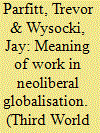

|
|
|
|
|
| Publication |
2012.
|
| Summary/Abstract |
This article argues that a central element of capitalist development, especially in its neo-liberal form, has been the configuration of a rationalised and individuated conception of work that helps to maximise capitalist efficiency. As the capitalist system has become globalised there has been an attempt to export this conception of work to the Global South by means of liberalisation programmes, many of them sponsored by the World Bank. These have entailed repression of organised labour in the attempt to force workers to adopt the role allocated to them by neo-liberalism, that of individual rational maximisers of utilities. It is argued that this attempt to globalise a neo-liberal conception of work must confront an Asia wherein local values (notably a preference for communitarian rather than individualistic values) and conditions have led both state and civil society to frame the concept of work as having collective rather than just individual significance.
|
|
|
|
|
|
|
|
|
|
|
|
|
|
|
|
| 5 |
ID:
122833
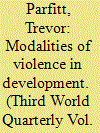

|
|
|
|
|
| Publication |
2013.
|
| Summary/Abstract |
This paper examines the relationship between violence and development. It explores whether violence is an intrinsic (structural) part of development, or a contingent result of poor or mistaken policies and practices that might be corrected. The issue of how far an element of violence might be desirable for development is also considered. These two issues are debated in the context of a variety of approaches to development and in light of various accounts of violence offered by analysts such as Fanon, Benjamin, Critchley and Zizek. In conclusion it is argued that an emancipatory conception of development may be reconciled with Benjamin's idea of divine violence in the form of a Badiouan event-with the proviso that the Derridian conception of the economy of violence is also applied in such a way as to minimise, or at least limit violence.
|
|
|
|
|
|
|
|
|
|
|
|
|
|
|
|
| 6 |
ID:
098751
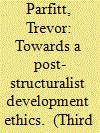

|
|
|
|
|
| Publication |
2010.
|
| Summary/Abstract |
The validity of development has been cast into doubt by postmodern critiques that have highlighted its failings. Attempts to rehabilitate the idea of development have brought ethics into play. This paper examines attempts to identify a viable basis for development based on post-structuralist ethical theories developed by analysts such as Levinas and Derrida that privilege the concept of alterity, or respect for the other. This approach is contrasted with Badiou's influential critique of an alterity-based ethics, critically examining his alternative of an ethics of the same. The article concludes by incorporating some of Badiou's insights into a reformulated ethics of alterity.
|
|
|
|
|
|
|
|
|
|
|
|
|
|
|
|